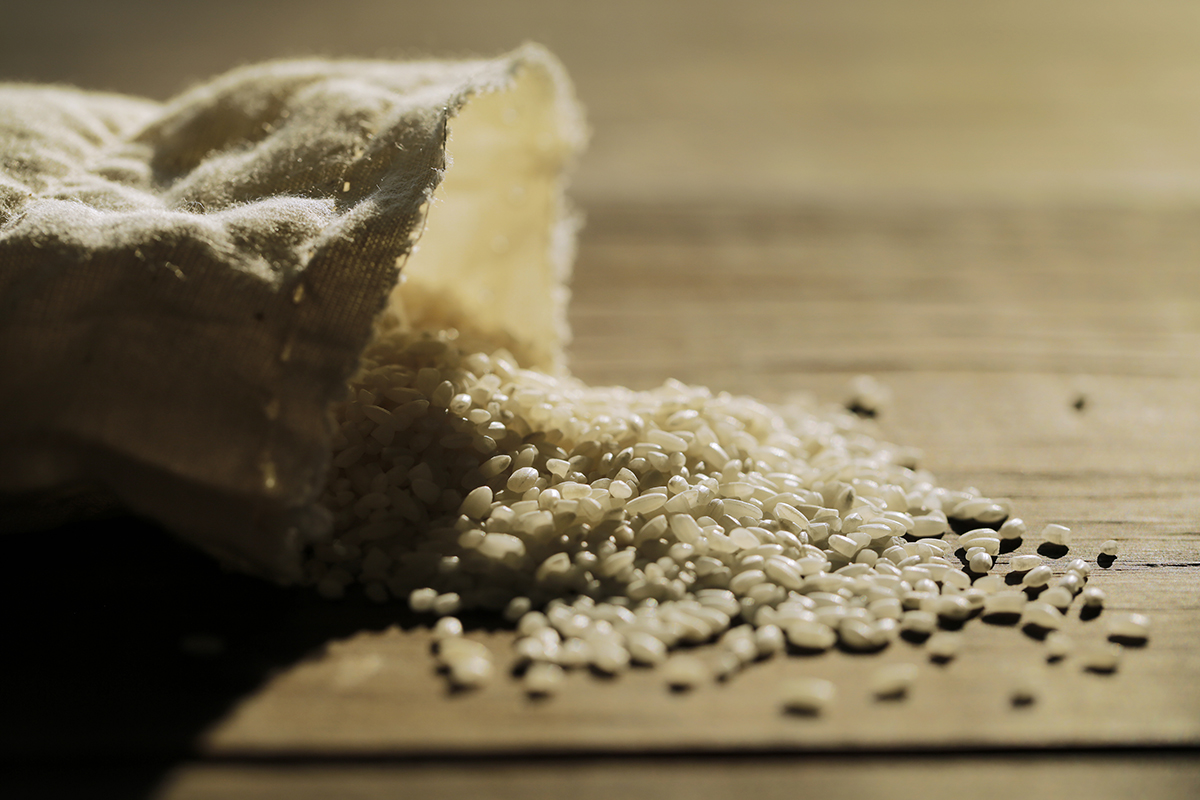
Photo by Bob Self
Scott and Lindsay Meyer Rely on History and Social Media at Rice Farm
In Florida, farmstead Congaree and Penn revives the heirloom grain.
Scott Meyer ’10 and Lindsay Moore Meyer ’09 are betting that if they grow fresh rice, Americans will eat it.
The husband-and-wife team operates Congaree and Penn, currently the only rice farm and mill in Florida. The progressive farmstead is 12 miles outside downtown Jacksonville in an area where rice was grown in the 1700s.
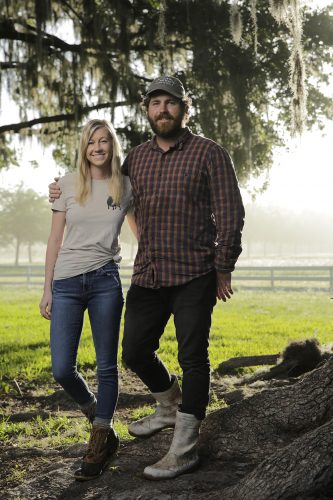
Lindsay and Scott Meyer operate Congaree and Penn, a rice farm and mill in Jacksonville, Florida, that has acquired a national following for its unique rice and fruit products. Photo by Bob Self
“No one had really started doing it again,” Scott said of his desire to spark a rice-farming revival.
At first, the Meyers intended to start a sustainable fish farm that would provide fertilizer for a crop of rice to be made into sake. But chefs from across the country have been eager to buy rice that has been milled — stripped of its outer layers — to their specifications. The surging demand created a market for artisanal rice, which is fresher and more nutritious than typical products on supermarket shelves.
For the first 12 weeks after planting, a 21st-century American rice paddy looks like a field of broad-blade grass. As the plant flowers and begins to pollinate, lime green rice grains emerge, each with starchy milk inside. A few weeks later, the milky substance turns to a bright white paste. Eventually, the paste becomes firm, and when a grain cannot be broken by a fingernail, it is ready
to harvest.
The Meyers collected Congaree and Penn’s first crop in 2014 by hand, using 2-foot knives similar to those used by early American settlers. They have since bought a combine harvester, which though smaller than a golf cart can cut an acre in about four hours.
Scott, who studied environmental science at TCU, decided to grow Jupiter rice, a medium-grain variety originally from Japan that is twice as long as it is wide, “like two cubes stacked on each other, but in a rice shape,” he said. The Jupiter variety has largely fallen out of favor with commercial farmers, leaving a niche for boutique farms to fill.
All rice must be milled before it is eaten. Brown rice is stripped of its inedible hull but minimally processed. If the inner bran and germ layers are removed, the result is white rice. Although white rice cooks faster, the additional milling strips the grain of its nutrients. The nutrients may be added back through enrichment, a process of spraying the rice grains with powdered nutrients.
“It’s hard to tell someone they’re gonna taste the difference,” Scott said, “but really what you’re used to from rice in the U.S. is just really, really, really low quality. Not fresh.”
Congaree and Penn stores rice with the hull on, providing the grain with natural protection from humidity and pests. When an order comes in, the rice is milled to the specifications of the chef.
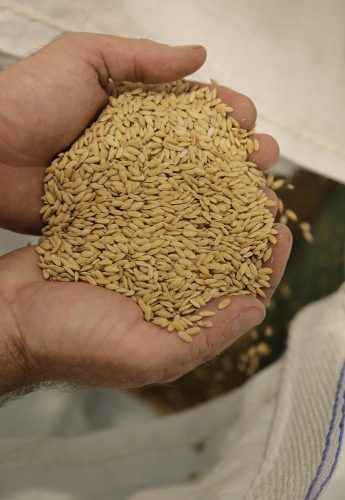
Scott Meyer holds unmilled Jupiter rice still in the hull that was grown at Congaree and Penn farm and mills. Photo by Bob Self
“What the chefs really like is the ability for it to be milled fresh: It holds a lot of those aromatics,” Scott said, referring to the subtle but fragrant and slightly nutty compounds found in some rice varieties.
The Meyers store their harvest along with rice grown by Scott’s cousin in Louisiana. All the rice is later milled at Congaree and Penn. The 22 combined acres produce about 100,000 pounds of rice a year. Most of the product is sold in Florida.
Scott said his rice is about five times more expensive than basic white rice. “We could never compete with your Uncle Ben’s or anything like that.”
Edouardo Jordan, named by the James Beard Foundation as Best Chef: Northwest in 2018, is willing to pay upward of $5 or $6 a pound for specialty rice. Jordan, a Florida native, discovered Congaree and Penn while searching for ingredients for his Seattle restaurant JuneBaby, an homage to the foodways of the Southern black experience.
Jordan orders his rice “barely polished,” meaning most of the bran is left on to preserve what he described as “grassy notes and wheat feel.” All of Jordan’s restaurants use rice as a staple. Congaree and Penn rice finds its way into gumbos, seafood curries and chitlins.
“The biggest thing for me,” Jordan said, “is trying to support something no one else is doing.”
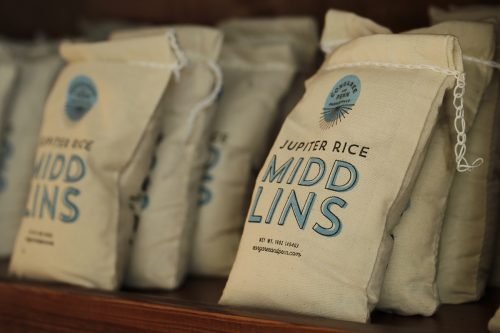
Bags of Congaree and Penn Jupiter Rice Middlins for sale at the farm. Photo by Bob Self
Trey Hartinger, a former culinary director for Congaree and Penn, said he is “selling a story and helping to preserve and celebrate the northeast Florida landscape — what we have and what we’ve been offering for years.”
One of Hartinger’s favorite products to chat about is called middlins. Before the Civil War, rice farming was a thriving industry in the South. Middlins, or the broken bits of the long-grain rice, became known colloquially as a poor person’s dish and was an important source of food in times of scarcity. Although Jupiter is a medium-short grain rice, Hartinger said the term middlins can be applied to the broken bits of any modern variety.
One of his favorite uses for middlins is in a truffle risotto. Unlike traditional arborio rice, which requires constant stirring, middlins are naturally starchy, so the cook can “approach it lazily,” Hartinger said. The truffles transport the risotto into gourmet territory.
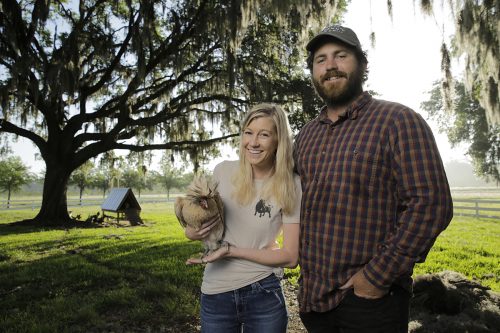
Lindsay Meyer, holding her buff lace Polish hen Beeper, and Scott Meyer take a moment under the oak trees in the livestock area at Congaree and Penn farm and mills as the morning sun illuminates the Spanish moss hanging from the trees. Photo by Bob Self
“We have really been carried by our chefs,” Lindsay said of Congaree and Penn’s success, which has included stories in The New York Times, The Wall Street Journal, Food & Wine and the Southern-based Garden & Gun magazine.
“There are a lot of people who believe in us and the grains we’re growing,” she said. “The only reason we are successful is because we have chefs who genuinely care about their food and what they’re serving to people, and [they] try to get the best product they can.”
Lindsay grew up on her family’s New Mexico farm, which has grown cotton, corn, alfalfa, Hatch chiles and melons, she said. “I never thought I’d end up with someone who was going into farming.”
After graduating from TCU, the Meyers nurtured a long-distance relationship. Lindsay worked as a freelance designer while living in a family cabin in Ruidoso, New Mexico. Scott worked as a field biologist at the Miracle Mile near Casper, Wyoming.
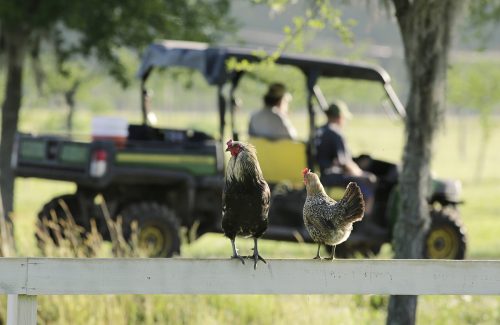
A rooster and a hen take in the activity from the fence rail at Congaree and Penn. Photo by Bob Self
The Meyers married in 2014 and started their rice farm the same year after Scott’s father offered to let them redevelop a 180-acre farm he had operated as a landscape tree nursery.
The couple initially sold rice in brown paper bags. Now the product comes packaged in muslin bags with screen-printed logos.
Lindsay said she “kind of just fell into” a branding and marketing role at the farm. Her undergraduate studies in graphic design, advertising and public relations paid off in unexpected ways. “We sell food. We grow food. We process food. We do farm tours. We have our website,” she said. “There’s just a lot of design work that goes into it.”
Selling rice — once considered a plain Jane commodity crop — is becoming easier as more consumers seek out heirloom or artisanal foods with taste, nutrition and a story.

Alumni Lindsay and Scott Meyer host an open house for social media influencers at Congaree and Penn in Jacksonville, Florida. Photo by Bob Self
“Our whole life, we’ve grown up knowing there are McIntosh and Granny Smith apples,” Scott said. Fruit varieties “got their differentiation first … but I feel like rice is kind of the one at the back of the line as far as people realizing you’ve got brown rice, black rice and red rice. And a lot more people are eating a lot more varieties than any time in a long time.”
But he isn’t interested in adding more rice varieties to the mix. “We’re really just focused on the Jupiter variety. We believe in it, and that’s all we’re really growing,” he said. “A lot of chefs have come and said, ‘You should grow black rice,’ or ‘I heard about this Italian wheat farro, and you should grow that.’
“Well, I’m growing something that grows really well and is naturally going to do well in my area, and I’m not going to have to put a lot of inputs in to make it work,” he said. “And that’s kind of our vision for the farm: doing things that are going to actually grow well, where you’re not fighting a battle you’re never going to win.”
Mike Slattery, professor and chair of environmental sciences at TCU, said he is not surprised by Scott’s success in sustainable farming. “He was just a very engaged student,” and one of a handful who earned a top grade in Slattery’s weather and climate class.
Unpredictable weather — Florida’s trademark humidity, rain and flooding, along with two hurricanes in two years — led the Meyers to hedge their bets with additional crops. They also planted a 5,000-tree mayhaw orchard; olive, fig, persimmon, mulberry and pecan trees; muscadine grapes; and Ouachita blackberries.
The Meyers draw people to the farm with agritourism: sold-out farm collaboration dinners, opportunities for guests to pick fruit, sunset cruises in a wagon pulled by a tractor to explore the farm’s many sustainable features, and Goat Greet, an opportunity to commune with the resident goats.
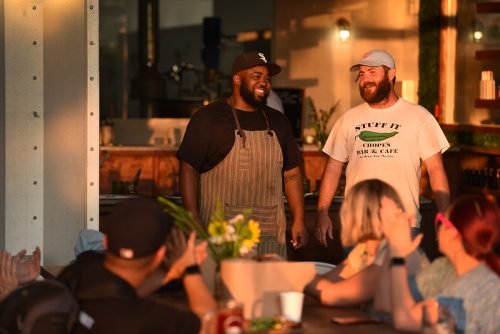
Scott Meyer introduces Chef Daniel Jordan IV to the guests at the open house for social media influencers at Congaree and Penn. The Meyers own and operate the farm where they have created a national following for their unique rice and fruit products. Photo by Bob Self
The ever-expanding Congaree and Penn product line includes grits, fish-fry seasoning and jellies. The Meyers also operate an on-site taproom featuring hard ciders flavored with the farm’s honey, mayhaws, grapes, berries and other Southern fruits. The foray into farming has necessitated learning how to build a food community willing to support the craft-farming efforts.
“I guess we have always cared about what we eat,” Lindsay said, “but I think we really started caring about local food and getting involved with the local food community when we started the farm.
“I don’t remember that being a part of my grandfather’s farm. It was just kind of a different era, where you grow the food, and you sell it to a grocery store or distributor. With us, it’s so much more personal, which is what I love about it.”

Your comments are welcome
4 Comments
How do I order mayhay jelly
Sounds delicious, right? Congaree and Penn’s website has mayhaw jelly: https://www.congareeandpenn.com/shop/mayhaw-jelly
They do not grow or harvest rice. All cider is shipped in from juice by other farmers. Please do research .
All the rice is from Louisiana, the so called rice patties are for show.
Related reading:
Alumni
What Is a Mayhaw?
The tart tree fruit that looks like a cross between a cranberry and a crabapple grows wild in the swamps and sloughs of the Gulf states.
Features
Congaree and Penn Shrimp and Asparagus Risotto
Chef Trey Hartinger brings Florida flavors to life with a delicious recipe.
Alumni, Features
Co-Founder of Calloway’s Nursery Thrives on Service
Jim Estill cultivates a life of hard work and lends his business expertise even in retirement.